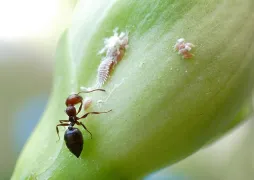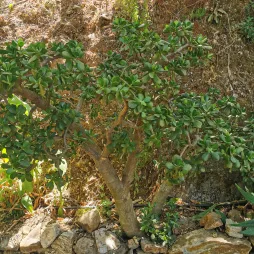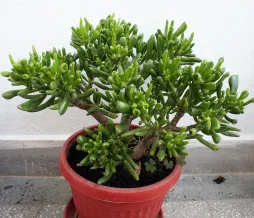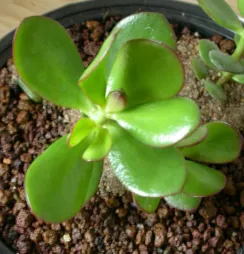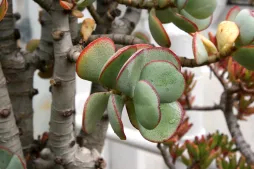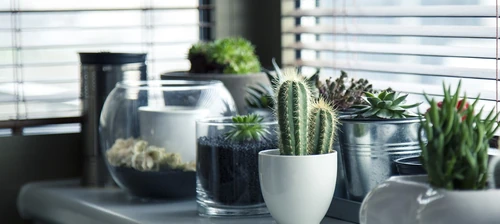Crassula muscosa, a succulent that's easy to live with
Crassula muscosa or Crassula lycopodioides is a succulent belonging to the Crassulaceae family. Native to Namibia and South Africa, it has made a name for itself in our latitudes. Its resistance to cold, drought and parasites makes it a highly appreciated indoor ornamental plant.
How to recognize Crassula muscosa?
This fat perennial has a dense, bushy habit. Although only 20 centimetres high, its spread can reach 30 centimetres.
Its long, bright-green stems are made up of square or rectangular leaves measuring five to eight millimeters. Their scale-like arrangement has earned Crassula muscosa the nickname "mouse tail".
In spring, tiny white or pale green star-shaped flowers bloom.
Like crassula ovata and crassula arborescens, Crassula muscosa is toxic. Although irritation is minor in humans, pets should be kept away from the plant and its sap.
Our maintenance tips
Your Crassula muscosa needs only two things: abundant watering and plenty of light. Don't hesitate to take your plant outside in summer to enjoy the sunny days!
Watering
Crassula muscosa are succulent plants. They can store water in their fleshy leaves and do not need to be watered regularly.
Water with room-temperature water only when the soil is completely dry. Water generously to allow the plant to build up its reserves.
Don't forget to drain off any stagnant water in the dish or planter. It can rot the roots.
Spray
Crassula muscosa grow in arid regions and do not like humidity. No need to spray them.
Repotting
Every spring, repot your Crassula muscosa to give it more space.
Choose a pierced terracotta or plastic pot. The latter has the advantage of retaining moisture longer. Place a layer of clay balls at the bottom (about a quarter of the way up). Top up with special potting soil for cacti or fat plants. You can also mix ordinary substrate with sand or perlite.
Plant your succulent and tamp down to eliminate air pockets. Then water for the first time.
Fertilization
To promote the growth of your Crassula muscosa, apply fertilizer in spring and summer.
Add cactus and succulent fertilizer to watering water.
If you're repotting every year, there's no need to add fertilizer. Your plant will find sufficient nutrients in its substrate.
Cleaning
To improve photosynthesis, clean the foliage with a damp sponge.
Prune
You can remove the yellowed leaves.
If you wish to control the development or shape of your plant, you can work on it. Just be sure to cut between two nodes or at the base of the trunk.
Always use a clean, sharp tool (pair of scissors, pruning shears).
Always use a clean, sharp tool (pair of scissors, pruning shears).
Plantation
When the risk of frost has passed, it's time to plant.
Where's the best place to plant your Crassula muscosa? A sunny spot at the top of a slope, to encourage rainwater drainage.
Dig a large hole to give the roots room to spread out. As for repotting, place a layer of gravel at the bottom, followed by a layer of substrate. Place your plant in the center and cover with soil, possibly enriched with leaf compost. Press down to eliminate air pockets and water.
Cutting
Cutting is carried out during the strong growth phase, generally in spring and early summer.
Using disinfected and sharpened pruning shears or scissors, remove a ten-centimeter stem (two leaf levels).
To allow the graft to heal, lay it flat in a ventilated room, out of direct sunlight, for two days.
Choose a pierced pot suited to the size of your cuttings. Choose a terracotta model. This material promotes uniform drying of the soil and reduces the risk of root rot.
Line the bottom with a bed of clay balls or gravel. Then pour in a substrate made up of equal parts potting soil, garden soil and sand. Plant your cutting and tamp it down. You can add a layer of sand to the surface.
Place your cutting in a bright spot away from direct sunlight. The temperature should be at least 18 degrees.
Disease / Threat
Information
| Family | Crassulaceae - Crassulaceae |
| Type | Crassula - Crassula |
| Species | Crassula muscosa - Crassula muscosa |
| Lifecycle | Perennial |
| Foliage | Evergreen |
| Exposures | |
| Substrat | |
| Planting methods |
Open ground In pots |
| Categories | |
| Tags |
Beginner Increvable Small pot |
| Origin |
South Africa |
| Hardiness (USDA) | 11a |
| Leaf color |
|
| Flower colors |
|
Discover plants from the same family














